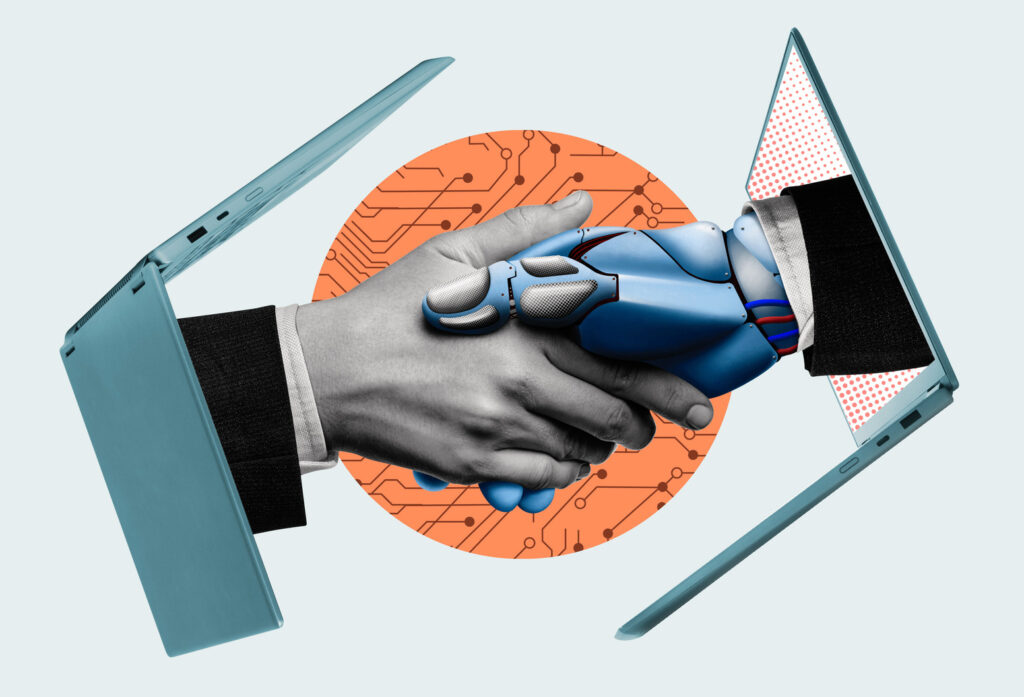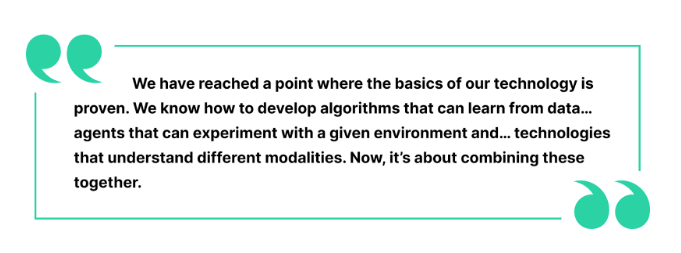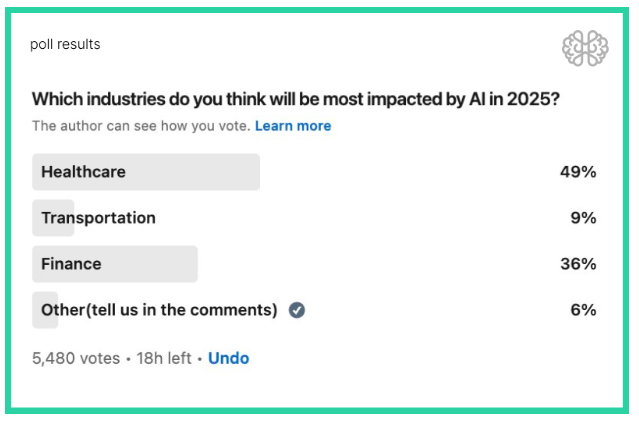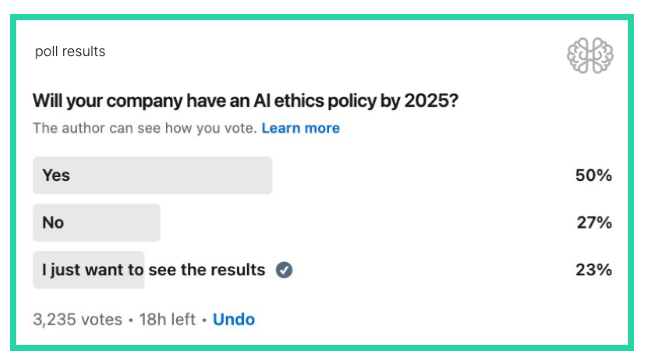AI’s next chapter in 2025

A new wave of AI is underway – a strategic shift from ‘play’ to ‘purpose’ in 2025. Are you prepared for the shift?
Since generative AI entered the market in 2022, companies have grappled with what it is and what to do with it. The past two-plus years have seen a playful – and some might say “tentative” – approach to AI.
Sure, big tech companies bet heavily on their technology to the tune of several billion dollars and mass layoffs. But everyday companies struggled to figure out what role AI would play in their workflows.
They experimented and often gave employees free rein with AI tools.
But few had a goal or implementation plan.
AI 2025 Predictions Overview
There’s a lot to be said for play in any industry. Experimentation is the true birthplace of innovation.
But if it isn’t followed by intentional strategies and implementation, managers will pave an expensive road that leads to nowhere.
FastCompany reports that there’s no question of use cases expanding. Instead, the question is how big and transformative those use cases will get.
Google echoes a similar sentiment. Koray Kavukcuoglu, Google DeepMind’s Chief Technology Officer says:

So, what exactly will this look like in 2025?
We think 2025 will bring more of these impressive AI implementations and true disruption. Still, some questions remain:
- Will ChatGPT remain the leading AI model or does it finally have strong competition?
- What AI feature will take the lead as the most disruptive?
- What are the industries that AI is most likely to transform in 2025?
- Are companies truly prepared for implementation with solid plans and AI ethics policies?
- What role will up-skilling play at the organisational and individual level in 2025?
Generative AI asked its community of more than 5 million AI enthusiasts to share their insights on these topics on LinkedIn. Their analyst collected the data, compared it to existing research, and generated these AI predictions for 2025.
1. ChatGPT Will Keep Its Title as Industry Leader

ChatGPT has been the reigning champion of the Generative AI industry since its release in November 2022. It’s unlikely to give up that lead anytime soon.
Almost 70% of Atlas readers said that OpenAI and its ChatGPT models would be the most successful in 2025. Google’s Gemini also had some promising support, but it’s still a long way from catching up to OpenAI.
That’s not to say that other models don’t stand a chance. Many people named options not even mentioned in the polls, such as xAI’s Grok and Amazon’s Nova.
Statista estimates an even larger market share for OpenAI’s platforms among developers, with 81.74% of developers using ChatGPT in 2024. Additionally, 44.2% of developers used GitHub Copilot and 22.4% used Google’s Gemini.
2. Multimodal AI Will Make the Biggest Impact Across Industries

Two AI features emerged as strong contenders for having the biggest impact across industries:
1. Multimodal AI
Until recently, generative AI models could only process text-based inputs. Multimodal AI has changed the game by processing virtually any type of data. The “mode” accepted may vary across models, but the technology processes these and other input types:
- Code
- Video
- Audio
- PDF documents
2. Agentic AI
Despite its slight lead in the GenAI polls, multimodal search took a backseat to agentic AI in the comments and the media.
PwC Inc. predicts that businesses could double their workforces by employing AI agents. However, it warns employers against using AI agents to replace human workers.
The CIO also cautions companies against this and predicts that at least one organisation will fail after attempting to replace 50% of its developers with AI agents. It also reports that 75% of companies who attempt to build their own agentic AI architectures will fail. Instead, businesses should leverage the expertise of established AI firms.
3. The Healthcare Industry Will Be the Most Heavily Impacted by AI Implementation

Healthcare received nearly half of the votes as the most likely industry to be heavily impacted by artificial intelligence. Finance also took a significant portion of the votes at 36%.
This aligns with Google listing healthcare among the top industries impacted. It recommends AI for administrative healthcare tasks and believes multimodal search will make it easier to sift through medical records. However, several readers raised valid concerns about the use of AI in healthcare settings.
Information technology was a top contender in the poll, with many predicting that AI would disrupt coding and cybersecurity workflows.
Adobe is a real-world example of this. It uses AI to fight AI-enabled cyberattacks and its engineers use AI to write junior-level code across multiple languages.
4. Most Business Will Draft and Implement New AI Strategies for 2025

The Atlas polls suggest that more than half of its readers work at companies that will create new AI strategies for 2025.
One reader rightly said, “AI strategy should evolve as the technology advances. With the rise of agentic AI, multimodal models, and domain-specific applications, companies must reassess their approaches to stay competitive.”
5. 50% of Employees Worldwide Will Work at Organisations With an AI Ethics Policy

The poll results imply that at least 50% of the readers will work at organisations that have an AI ethics policy in place by 2025.
The ethical and sustainable use of artificial intelligence has been a strong talking point over the years. In fact, in September 2023, tech giants behind Microsoft, Google, Meta, and several other tech companies had a closed-door summit with the Senate.
Why? To lobby for AI regulations.
Brewing concerns within the European Union also led to the EU AI Act. However, not all European countries are on board with its policies. For example, the United Kingdom got some flack for proposing that tech companies could train AI models on copyrighted data.
This plurality in AI ethics and policy development leaves final decisions up to organisations. It’s good to see so many of them stepping up to the challenge.
6. AI Upskilling Remains a Top Focus at the Individual and Organisational Level
AI upskilling remains a dominant theme in the modern workforce. Additionally, UX research shows that people aren’t just looking for a nice addition to their resume. They want:
- Advanced strategies they can immediately apply in their work. Theoretical concepts aren’t enough. They’re looking for tools that translate directly into impact.
- Industry-specific Insights. Whether it’s healthcare, finance, or manufacturing, people crave knowledge tailored to their unique sectors.
What Are Your Predictions for Gen AI in 2025?
2024 was a big year for artificial intelligence, and we believe 2025 will outperform it by a landslide.
Do you agree with our 2025 predictions?
Let’s discuss this further. Schedule a meeting here
